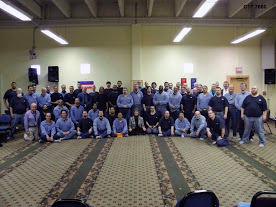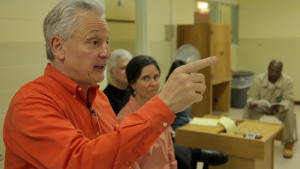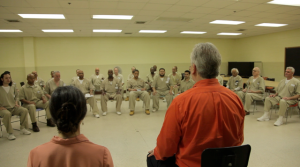Friday
Featured StoriesBringing the Shambhala Principle to Prison
The Prison Outreach Affinity Circle was started by Trime Persinger in 2013. The group had its first conference call in September of that year. Our main focus is to explore how our work in corrections is benefited by applying the Shambhala Principle to it. One benefit we felt was the ability to share our experiences with each other. Nealy Zimmermann is currently the Circle Facilitator and Cara Thornley is the Support Facilitator. On March 10, 2014, a conversation was hosted by Richard Reoch and Adela Sandness via Adobe Connect. The conversation was recorded and transcribed following which the transcript was edited and divided into three parts. Following is Part One, during which each participant shared something about their experience working in prisons. The next two parts will be published over the course of the summer.
Conversation participants: Shastri Henry Chapin, Kate Crisp, Acharya Fleet Maull, Margot Neuman, Trime Persinger, Nealy Zimmermann (Circle Facilitator), Cara Thornley
Part 1: “The possibilities of basic goodness can illuminate all the dark corners.”
Henry Chapin (Shastri, a volunteer at a holding facility where he meets with inmates one on one): I had been working with an inmate for about a year who was in for drugs and assault. This inmate had a lot of anger but had an interest in meditation. I gave him some books including Pema [Chodron’s]. Then after a few months of not seeing him, the inmate showed up and started sobbing uncontrollably. He confessed he had been a white supremacist. He showed his tattoos, one of which says “hate is purity.” As a result of reading the books and contemplating the harm he had caused people, he had an epiphany. For the first time he understood that his life had been about associating with hate groups and when he read Pema, his whole view was transformed. He had found something he couldn’t find anywhere else.
Trime Persinger (Chaplain, Snake River Correctional Institution): For me, it is about hope. For people who live in a prison environment, and people who work there–there is a darkness about the prison environment. There is a darkness about the whole experience. The Shambhala Principle provides some kind of way of approaching that which cuts right through the darkness and illuminates people’s basic goodness. The possibilities of basic goodness can illuminate all the dark corners. Basic goodness affirms people–there is a quality of light and positive. The connection with what is positive in themselves when everything around them is telling them that they are not OK–people respond to that. We all have multiple, multiple stories.
What I love about working in prison, is that there is so much darkness and so these teachings just shine. Every time I go into prison–and especially when I go into special housing–segregation units–I walk through, and I get to be a light where there is not much light. It is such a gift. It is so amazing to me to do this. Many people just respond to that and connect to their own basic goodness in that way.
Nealy Zimmerman (prison volunteer): I think that within the correctional system, the concepts of good and bad are heightened, and there are all kinds of support for that. Inmates are seen as basically bad; society sees them as bad for acts they have committed. When they are in prison, they wear certain clothing, and they are watched over by police, i.e. correction officers. They are given tickets for infractions. On top of that, there is a fair amount of dysfunction, of injustice, in the system. So they are constantly bombarded with negative concepts about themselves. The divergence from the Shambhala Principle is huge.
The ensuing suffering they experience is like literally hell on earth. When we come in, we see them–we volunteers, in my experience–I see them as human beings. I think they can pick up on that, and they feel the difference. They can sense that, and they appreciate being seen as humans. They are very hungry for that. They are very open to being open when they have the opportunity because they do not have that opportunity. So, when they do open, they open very deeply. It is so profound, that I feel humbled by them. I think they feel that too. They are not used to being honored or seen as decent people. They just appreciate that so much.
Kate Crisp (Executive Director, Prison Mindfulness Institute): Last week we were doing the “Who Am I” process. The women had taken the class twice. The first time they took it, they had really horrible identities that they came up with, such as: “I’m a loser.” The second time, they came up with more positive identities, like: “I am a creative person”; “I am a good mother.”
At the end, I had them go around and say, “I am basically good.” I was nervous about it, because they are sometimes a tough crowd: they don’t want any B.S. But they were very into it. They said: “I AM basically good, Kate!” They were all laughing and having a great time. “I AM basically good!” And they said, “We feel great!” I said “Wow, you guys are so enthusiastic about this!” and they said, “We are, we are, we ARE basically good!” It appeared this was the first time they had ever said such a thing in a group.
Fleet Maull (Acharya, Founder, Prison Mindfulness Institute): I had the opportunity to go to a maximum security juvenile facility in St. Louis last week, which was great because it was my home town. I was in a small classroom with ten young men aged 14 to 17. At one point, I was inviting them to explore where they have choice in their life and how taking more ownership for their choices could be a springboard to new possibilities in their lives. I was able to challenge them a bit in this way, without any sense of their being anything wrong with them whatsoever, quite the contrary. The beauty of it–and I caught myself smiling at it a number of times–was that I was able to do this with absolute certainty and complete faith in their unconditional goodness, and it was not like I was telling them they were basically good as some kind of therapeutic tool or a good thing for them to hear. It was my actual experience in the moment…I was looking into their eyes, and I absolutely saw it–and I absolutely believed it.
It is so joyful to be able to do that, rather than to be sitting there and trying to figure out how to help these poor kids who are so screwed up; how can I do something clever to help them? I didn’t have to be in that mind space at all. I could just be in this heart space with them, of having complete faith trust in their basic goodness and my own basic goodness; and so it was great.
Margot Neuman (Founder, the Mindfulness Peace Project and the Ratna Peace Initiative): I just returned from Florida where I visited prisons that I have a connection with. I am happy to say that I was taking the Great Eastern Sun into a prison on Shambhala Day. On this trip, I was able to begin working on something that I have been trying to accomplish for a while. It is a secular mindfulness group for incarcerated veterans. In another prison I began a secular mindfulness group with the general prison population, but had difficulty finding space to hold regular meetings. I hope these groups can have weekly meetings all year long because there are senior students of ours (or other traditions) that have enough experience with meditation to lead a mindfulness group.
I get a lot of backlash about the term “basic goodness.” I also get it with veterans out here in Colorado too. If you are talking to Buddhists, or to a Buddhist group, that is one thing. But if you are talking about basic goodness from a secular point of view, a lot of people…I mean, almost all of the people in our groups are Christian, and they believe that they are born evil. So, I found that I had to say something like “basic nature,” and Gary (also of the Ratna Peace Initiative) said that he uses the term “basic sanity.”








May 1, 2015
Reply
Wonderful and amazing work you are all doing. Thank you thank you.
May 1, 2015
Reply
These anecdotes are very touching to read. Thank you for bringing this dharma to our brothers and sisters in the prison system.